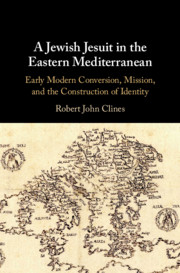 A Jewish Jesuit in the Eastern Mediterranean
A Jewish Jesuit in the Eastern Mediterranean Book contents
- A Jewish Jesuit in the Eastern Mediterranean
- A Jewish Jesuit in the Eastern Mediterranean
- Copyright page
- Contents
- Acknowledgments
- Introduction
- 1 Becoming a Jewish Jesuit: Eliano’s Early Years
- 2 Jesuit Missionary or Jewish Renegade? Eliano’s Confrontation with His Jewish Past
- 3 Jesuit Anti-Judaism and the Fear of Eliano’s Jewishness on the First Mission to the Maronites of Lebanon
- 4 Textual Transmission, Pastoral Ministry, and the Re-Fashioning of Eliano’s Intellectual Training
- 5 Revisiting Eliano’s Jewishness on His Return to Egypt
- 6 The Coptic Mission, Mediterranean Geopolitics, and the Mediation of Eliano’s Jewish and Catholic Identities
- 7 Eliano’s Reconciliation with His Jewishness in His Later Years
- Epilogue
- Bibliography
- Index
Epilogue
Published online by Cambridge University Press: 27 September 2019
- A Jewish Jesuit in the Eastern Mediterranean
- A Jewish Jesuit in the Eastern Mediterranean
- Copyright page
- Contents
- Acknowledgments
- Introduction
- 1 Becoming a Jewish Jesuit: Eliano’s Early Years
- 2 Jesuit Missionary or Jewish Renegade? Eliano’s Confrontation with His Jewish Past
- 3 Jesuit Anti-Judaism and the Fear of Eliano’s Jewishness on the First Mission to the Maronites of Lebanon
- 4 Textual Transmission, Pastoral Ministry, and the Re-Fashioning of Eliano’s Intellectual Training
- 5 Revisiting Eliano’s Jewishness on His Return to Egypt
- 6 The Coptic Mission, Mediterranean Geopolitics, and the Mediation of Eliano’s Jewish and Catholic Identities
- 7 Eliano’s Reconciliation with His Jewishness in His Later Years
- Epilogue
- Bibliography
- Index
Summary
This short epilogue revisits the major themes of the book. Rather than delving back into Eliano’s life, this epilogue uses the plaque that was placed in the cobblestones of Campo de’ Fiori in Rome in 2011 to commemorate the burning of the Talmud – in which Eliano participated – in 1553. Inscribed on the plaque are “the pages burn, but the letters fly” and “invoke peace for whoever laments your burning.” These quotes capture the essence of the futility of erasure and desires to ignore the burden that the past bears on the present. But these quotes also point to the very real ways in which the human experience transcends Eliano and the religio-cultural landscape of the early modern Mediterranean. This epilogue invites the reader to think more broadly about identity construction and individuals’ role in it through their interactions with one another. Just as Eliano constructed his sense of self by performing his Catholicness in light of his Jewishness in the theater of the everyday, so too do we confront difference, reconcile pasts and presents, attempt to construct better senses of ourselves, and come to terms with where we fit in the world.
Keywords
- Type
- Chapter
- Information
- A Jewish Jesuit in the Eastern MediterraneanEarly Modern Conversion, Mission, and the Construction of Identity, pp. 222 - 227Publisher: Cambridge University PressPrint publication year: 2019
